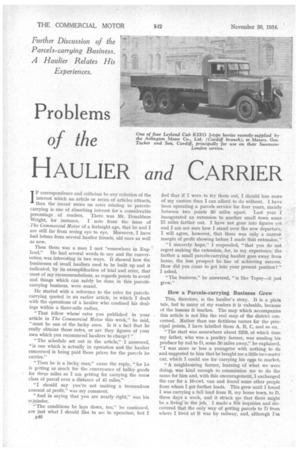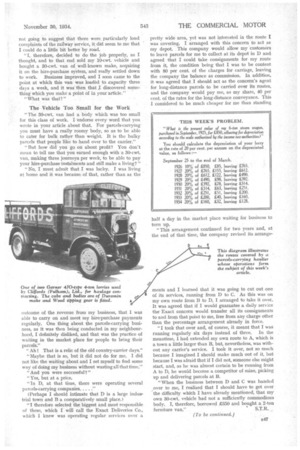Problems of the
Page 64

Page 65

If you've noticed an error in this article please click here to report it so we can fix it.
HAULIER and CARRIER IF correspondence and criticism be any criterion of the interest which an article or series of articles attracts, then the recent series on rates relating to parcelscarrying is one of absorbing interest for a considerable percentage of readers. There was Mr. Donaldson
Wright, for instance. I note from the issue of The Commercial Motor of a fortnight ago, that he and I are still far from seeing eye to eye. Moreover, I have had letters from several haulier friends, old ones as well as new.
Then there was a man I met "somewhere in England." He had several words to say and the conversation was interesting in two ways. It showed how the businesses of small hauliers used to be built up and it indicated, by its exemplification of trial and error, that most of my recommendations, as regards points to avoid and things which can safely be done in this parcelgcarrying business, were sound.
He started with a reference to the rates for parcelscarrying quoted in an earlier article, in which I dealt with the operations of a haulier who confined his dealings within a three-mile radius.
"That fellow whose rates you published in your article in The Commercial Motor this week," he said, "must be one of the lucky ones. Is it a fact that he really obtains those rates, or are they figures of your own which you recommend hauliers to charge?"
"The schedule set out in the article," I answered, "is one which is actually in operation and the haulier concerned is being paid those prices for the parcels he carries."
"Then he is a lucky, man," came the reply, "for he is getting as much for the conveyance of bulky goods for three miles as I am getting for carrying the same class of parcel over a distance of 45 miles."
"I should say you're not making a tremendous amount of profit," was my comment.
"And in saying that you are nearly right," was his rejoinder.
"The conditions he lays down, too," he continued, are just what I should like to see in operation, but I B46 feel that if I were to try them out, I should lose more of my custom than I can afford to do without. I have been operating a parcels service for four years, mainly between two points 30 miles apart. Last year I inaugurated an extension to another small town some 15 miles farther out. I have not gone into figures yet and I am not sure how I stand over the new departure. I will agree, however, that there was only a narrow margin of profit showing before I made that extension.'' "I sincerely hope," I responded, "that you do not regret making the extension, for, in my experience, the farther a small parcels-carrying haulier goes away from home, the less prospect he has of achieving success. How did you come to get into your present position?" I asked.
"The business," he answered, "is like Topsy—it just crew."
How a Parcels-carrying Business Grew
This, therefore, is the haulier's story. It is a plain tale, but to many of my readers it is valuable, because of the lessons it teaches. The map which accompanies this article is not like the real map of the district concerned. Rather than use fictitious names for the principal points, I have labelled them A, B, C, and so on.
"The start was somewhere about 1929, at which time my father, who was a poultry farmer, was sending his produce by rail to D, some 30 miles away," he explained. "I was more or less a youngster with nothing to do and suggested to him that he bought me a little two-seater car, which I could use for carrying his eggs to market.
"A neighbouring farmer, learning of what we were doing, was kind enough to commission me to do the same for him and with this encouragement, I exchanged the car for a 10-cwt, van and found some other people from whom I got further loads. This grew until I found I was carrying a full load from B, my home town, to D, three days a week, and it struck me that there might be a living-in the job. I made a few inquiries and discovered that the only way of getting parcels to D from where I lived at B was by railway, and, although I'm not going to suggest that there were particularly loud• complaints of the railway service, it did seem to me that I could do a little bit better by road.
"I, therefore, decided to do the job properly, as I thought, and to that end sold my 10-cwt. vehicle and bought a 30-cwt. van of well-known make, acquiring it on the hire-purchase system, and really settled down to work. Business improved, and I soon came to the point at which this van was loaded to .capacity three days a week, and it was then that discovered something which you make a point of in your article."
"What was that?"
The Vehicle Too Small for the Work
"The 30-cwt. van had a body which was too small for this class of work. I endorse every word that you wrote in your article about that. For parcels-carrying you must have a really roomy body, so as to be able to cater for bulk rather than weight. It is the bulky parcels that people like to hand over to the carrier."
"But how did you go on about profit? You don't mean to tell me that you earned enough with a 30-cwt. van, making three journeys per week, to be able to pay your hire-purchase instalments and still make a living?"
"No, I must admit that I was lucky. I was living at home and it was because of that, rather than as the outcome of the revenue from my business, that I was able to carry on and meet my hire-purchase payments regularly. One thing about the parcels-carrying business, as it was then being conducted in my neighbourhood, I definitely disliked, and that was the practice of waiting in the market place for people to bring their parcels."
" ! That is a relic of the old country-carrier days." "Maybe that is so, but it did not do for me. I did not like the waiting about and I set myself to find some way of doing my business without wasting all that time." "And you were successful?"
"Yes, but at a price.
"In D, at that time, there were operating several parcels-carrying companies
(Perhaps I should intimate that D is a large industrial town and B a comparatively small place.)
"I therefore selected the biggest and most responsible of these, which I will call the Exact Deliveries Co., which I knew was operating regular services over a pretty wide area, yet was not interested in the route I was covering. I arranged with this concern to act as my depot. This company would allow my customers to leave parcels for me to collect at its depot in D and agreed that I could take consignments for my route from it, the condition being that I was to be content with 80 per cent. of the charges for carriage, leaving the company the balance as commission. In addition, it was agreed that I should act as the concern's agent for long-distance parcels to be carried over its routes, and the company would pay me, as my share, 40 per cent. of the rates for the long-distance conveyance. This I considered to be much cheaper for me than standing half a day in the market place waiting for business to turn up. "This arrangement continued for two years and, at the end of that time, the company revised its arrange ments and I learned that it was going to cut out one of its services, running from D to C. As this was on my own route from B to D, I arranged to take it over. It was agreed that if I would guarantee a daily service the' Exact concern would transfer all its consignments to and from that point to me, free from any charge other than the percentage arrangement already in force.
"I took that over and, of course, it meant that I was running regularly six days instead of three. In the meantime, I had extended my own route to A, which is a town a little larger than B, but, nevertheless, was without any carrier's service. I took it over, not so much because I imagined I should make much out of it, but because I was afraid that if I did not, someone else might start, and, as he was almost certain to be running from A to D, he would become a competitor of mine, picking up and delivering parcels at B.
"When the business between D and C was handed over to me, I aealized that I should have to get over the difficulty which I have already mentioned, that my own 30-cwt. vehicle had not a sufficiently commodious body. I, therefore, borrowed £350 and bought a. 2-ton furniture van." S.T.R.




































































































